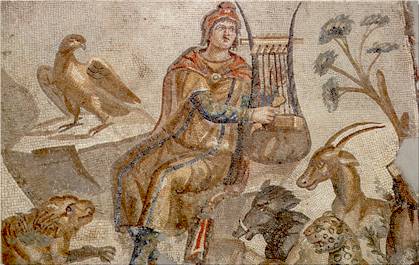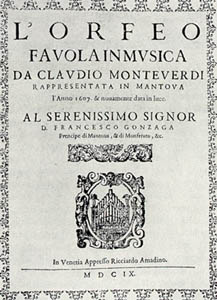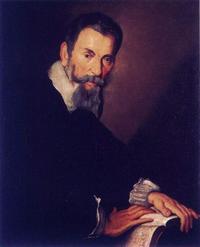
A recording of Monteverdi's Orfeo is available through Columbia University's online reserves here.

|
Claudio Monteverdi's Orfeo is widely considered the first great opera. The libretto, penned by Monteverdi's friend Alessandro Striggio, relates the legend of Orpheus and his descent into the underworld to recover his beloved, Euridice. Monteverdi's opera was commissioned by a wealthy group of Mantuan nobility known as the Accademia degl'Invaghiti whose members included Striggio and the heir to the Mantuan throne, Francesco Gonzaga. Gonzaga's palace would later serve as the location for the premiere of Orfeo on 24 February 1607; a second performance was prepared for the ladies of the city the following week. Opera as a musical genre was the development of a group of Florentines who were looking for a way to present plays in music. The Florentine Camerata, as they were known, looked to early Greek drama, which was believed to be entirely sung, as a model. To recreate the ethos of Greek drama they used a new form of vocal writing, known as monody, to heighten the words of the drama. Over the accompaniment of basso continuo (chords improvised from a framework given by the composer and performed by a chordal instrument or instruments, such as lutes, harpsichords and the like and a bass instrument such as a cello) a soloist would sing in a type of heightened speech, known as recitative. Interspersed throughout the opera were also sung passages, often strophic or rhythmically lively, known as arias, and passages halfway between recitative and aria, known as arioso. The structure was filled out with choral numbers, dances, ritornelli (instrumental interludes) and so forth. It is important to remember that modern notions of opera or film were nonexistent in the 1600s. Drama functioned more as ritual than as excitement. When Monteverdi approached the composition of Orfeo, he approached it as he would a ritual text, such as a Mass. However, given that most music of the time was of significantly shorter duration, Monteverdi realized that he would need to have a larger musical form to tie the varied elements of the opera together. To do so, Monteverdi arranged his opera in a chiastic structure - (a structure in which individual parts pivot around a central axis, as in, for instance ABCBA) pivoting around the third act and its climactic aria Possente Spirto ("Powerful Spirit"), an aria in which Orfeo tries to convince Charon, the boatman who ferries souls across the rivers that divide the world of the living from the world of the dead, to allow him, a mortal, entry into the underworld. |
 |

|
Links to the Libretto Toccata: A call to attention. Prologue: Act One: Act Two: Act Three: Act Four: Act Five: |
|
Toccata Prologue LA MUSICA: Dal mio Permesso amato a voi ne vegno, Incliti eroi, sangue gentil di Regi, Di cui narra la Fama eccelsi pregi, Né giugne al ver, perch'è tropp'alto il segno. Io la Musica son, ch'ai dolci accenti So far tranquillo ogni turbato core, Et hor di nobil ira, et hor d'amore Posso infiammar le più gelate menti. Io su cetera d'or cantando soglio Mortal orecchia lusingar talhora, E in guisa tal de l'armonia sonora de le rote del Ciel più l'alme invoglio. Quinci a dirvi d'ORFEO desio mi sprona D'ORFEO che trasse al suo cantar le fere, E servo fè l'Inferno a sue preghiere Gloria immortal di Pindo e d'Elicona. Hor mentre i canti alterno hor lieti, hor mesti Non si mova augellin fra queste piante, Né s'oda in queste rive onda sonante, Et ogni Auretta in suo camin s'arresti. Act 1 PASTORE I: In questo lieto e fortunato giorno C'ha posto fine a gli amorosi affanni, Del nostro Semideo cantiam Pastori Con sì soavi accenti Che sien degni d'ORFEO nostri concenti. Oggi fatt'è pietosa L'alma già sì sdegnosa De la bella EURIDICE. Oggi fatt'è felice ORFEO nel sen di lei, per cui già tanto Per queste selve ha sospirato, e pianto. Dunque in sì lieto e fortunato giorno C'ha posto fine a gli amorosi affanni Del nostro Semideo cantiam Pastori Con sì soavi accenti Che sien degni d'ORFEO nostri concenti. CHORO NINFE, PASTORI Vieni, Imeneo, deh vieni e la tua face ardente sia quasi un Sol nascente ch' apporti à questi amanti i dì sereni e lunge homai disgombre de gli affanni e del duol le nebbie e l'ombre. NINFA Muse honor di Parnaso, amor del cielo, gentil conforto a sconsolato core, vostre cetre sonore squarcino d' ogni nube il fosco velo; e mentre oggi propizio al vostro Orfeo invochiam Imeneo sù ben teamprate corde. Co' l vostro suon, nostra armonia s' accorde. NINFE, PASTORI Lasciate i monti, lasciate i fonti, ninfe vezzose e liete, e in questi prati a i balli usati leggiadro il piè rendete. Qui miri il sole vostre carole più vaghe assai di quelle, ond' a la Luna, a l' aria bruna, danzan in ciel le stelle. Ritornello Lasciate i monti, lasciate i fonti, ninfe vezzose e liete, e in questi prati a i balli usati leggiadro il piè rendete. Qui miri il sole vostre carole più vaghe assai di quelle, ond' a la Luna, a l' aria bruna, danzan in ciel le stelle. Poi di bei fiori, per voi s' onori, di questi amanti il crine, ch' or dei martiri de i lor desiri godon beati al fine. Ritornello PASTORE Ma tu, gentil cantor, s'à'tuoi lamenti già festi lagrimar queste campagne, perch' hora al suon de la famosa cetra non fai teco gioir le valli e i poggi? Sia testimon del core qualche lieta canzon che detti amore. ORFEO: Rosa del ciel, vita del mondo, e degna Prole di lui che l'universo affrena; Sol, che'l tutto circondi e'l tutto miri Da gli stellanti giri, Dimmi, vedestù mai Di me più lieto e fortunato Amante? Fu ben felice il giorno, Mio ben, che pria ti vidi; E più felice l'hora Che per te sospirai, Poi ch'al mio sospirar tu sospirasti. Felicissimo il punto Che la candida mano, Pegno di pura fede, à me porgete. Se tanti cori havessi Quant'occhi ha'l ciel eterno, e quante chiome Han questi colli ameni il verde maggio, Tutti colmi sarieno e traboccanti Di quel piacer ch'oggi mi fa contento. EURIDICE Io non dirò qual sia nel tuo gioire, Orfeo, la gioia mia, che non hò meco il core, ma teco stassi in compagnia d' Amore. Chiedilo dunque a lui s' intender brami quanto lieta i gioisca, e quanto t' ami. NINFE, PASTORI Lasciate i monti, lasciate i fonti, ninfe vezzose e liete, e in questi prati a i balli usati leggiadro il piè rendete. Qui miri il sole vostre carole più vaghe assai di quelle, ond' a la Luna, a l' aria bruna, danzan in ciel le stelle. Ritornello CHORO NINFE, PASTORI Vieni, Imeneo, deh vieni e la tua face ardente sia quasi un Sol nascente ch' apporti à questi amanti i dì sereni e lunge homai disgombre de gli affanni e del duol le nebbie e l'ombre. PASTORE Ma s' il nostro gioir dal ciel deriva, come dal ciel ciò che quà giù s' incontra, giust' è ben che divoti gl' offriam incensi e voti. Dunque al tempio ciascun rivolga i passi a pregar lui ne la cui destra è il mondo, che lungamente il nostro ben conservi. Ritornello PASTORI Alcun non sia che disperato in preda si doni al duol, benché talhor n' assaglia possente sì che la nostra vita inforsa . Ritornello NINFE, PASTORI Che poi che nembo rio gravido il seno d' atra tempesta inorridito hà il mondo, dispiega il sol più chiaro i rai lucenti. Ritornello PASTORI E dopo l' aspro gel del verno ignudo veste di fior la primavera i campi. NINFE, PASTORI Orfeo di cui pur dianzi furon cibo i sospir bevanda il pianto, oggi felice è tanto che nulla è più che da bramar gli avanzi. |
Toccata Prologue MUSIC: From my beloved Permessus I come to you, illustrious heroes, noble scions of kings, whose glorious deeds Fame relates, though falling short of the truth, since the target is too high. I am Music, who in sweet accents can calm each troubled heart, and now with noble anger, now with love, can kindle the most frigid minds. I, with my lyre of gold and with my singing, am used to sometimes charming my mortal ears, and in this way inspire souls with a longing for the sonorous harmony of heaven's lyre. From here desire spurs me to tell you of Orpheus, Orpheus who drew wild beasts to him by his songs and who subjugated Hades by his entreaties, the immortal glory of Pindus and Helicon. Now while I alternate my songs, now happy, now sad, let no small bird stir among these trees, no noisy wave be heard on these river-banks, and let each little breeze halt in its course. Act 1: FIRST SHEPHERD: On this happy and auspicious day which has put an end to the amorous torments of our demi-god, let us sing, shepherds, in such sweet accents that our strains shall be worthy of Orpheus. Today fair Eurydice's heart, formerly so disdainful, has been touched with compassion. Today Orpheus has been made happy in the bosom of her, for whom he already sighed and wept so much amongst these woods. Therefore, on so happy and auspicious a day which has put an end to the amorous torments of our demi-god, let us sing, shepherds, in such sweet accents that our strains shall be worthy of Orpheus. CHORUS OF NYMPHS AND SHEPHERDS: Descend of Hymen, descend, and may your glowing torch be like a rising sun bringing to these lovers cloudless days and scattering afar the hideous murky shades of care and pain NYMPH: Muses, honour of Parnassus, beloved by heaven, tender consolation to the dejected heart, let your harmonious lyres rend the dark veil from every cloud: and while we today in favour of your Orpheus invoke Hymen on well-tuned strings, our harmony accords with your sound. NYMPHS, SHEPHERDS: Come from your hills, come from your springs, ye Nymphs so comely and happy, and in these meadows where dance is no stranger, trip on your dainty feet. Here shall the Sun behold your measures, lovelier far than those danced to the moon at dead of night by the stars of the sky. Ritornello Come from your hills, come from your springs, ye Nymphs so comely and happy, and in these meadows where dance is no stranger, trip on your dainty feet. Here shall the Sun behold your measures, lovelier far than those danced to the moon at dead of night by the stars of the sky. Then with your choice blooms by you be adorned the brows of these lovers, who, after the torment of their longing, are now happy at last. Ritornello SHEPHERD 2: But since, sweet singer, formerly you made these meadows weep in sympathy with your grief, why do you not make these hills and dales rejoice now to the sound of your famous lyre? Let some joyful song inspired by love bear witness to your heart. ORFEO: Rose of heaven, life of the world, and worthy progeny of him who governs the universe; Sun, who circumscribes everything and sees everything, From your starry rounds, Tell me, did you ever see than I a happier and more fortunate lover? Happy was the day, My love, that first I saw you; And even happier the hour That I sighed for you, Since at my sigh, you sighed. Happiest the moment That your white hand, A pledge of pure faith, to me you offered. If I had as many hearts As heaven has eternal eyes, and as many leaves as have these pleasant hills this green May, All would be filled and overflowing With that pleasure that today makes me content. EURIDICE: I cannot say how great the joy your joy, Orpheus, inspires in me may be, since my heart is not with me but with you, companioned by Love. Ask him, therefore, if you long to know how it rejoices and how much it loves you. CHORUS: Come from your hills, come from your springs, ye Nymphs so comely and happy, and in these meadows where dance is no stranger, trip on your dainty feet. Here shall the Sun behold your measures, lovelier far than those danced to the moon at dead of night by the stars of the sky. Ritornello CHORUS: Descend of Hymen, descend, and may your glowing torch be like a rising sun bringing to these lovers cloudless days and scattering afar the hideous murky shades of care and pain SHEPHERD 1: But if our gladness is derived from heaven like everything around us here below, as devotees it is our bounden duty to offer incense to the gods, and prayers, So to the Temple let us all repair to pray that he whose right hand holds the world will long preserve the life of our beloved. Ritornello SHEPHERDS 1, 3: Let there be none who , prey to despair, gives way to sorrow, though at times this may assail us so strongly as to threaten life. Ritornello NYMPH, SHEPHERD 2, 4: For when the lowering, heavy-burdened cloud have terrified the world with tempest dire, the Sun more brightly casts his radiant beams. Ritornello SHEPHERDS 1, 3: And after the bitter cold of naked winter, Spring clothes the fields with flowers. CHORUS: See, here comes Orpheus, who formerly made sighs his food and tears his drink; today he is so happy that there is nothing more he can desire. |
|
from Act 3: Possente Spirto ORFEO Possente Spirto e formidabil nume, senza cui far passaggio à l' altra riva alma da corpo sciolta in van presume. Ritornello Non viv'io no, che poi di vita e priva Mia cara sposa il cor non e piu meco E senza cor com'esser puo ch'io viva? Ritornello A lei volt' ho 'l camin per l' aër cieco, a l' Inferno non già, ch' ovunque stassi tanta bellezza il paradiso hà seco. Ritornello Orfeo son io che d' Euridice i passi segue per queste tenebrose arene, ove già mai per uom mortal non vassi. O de le luci mie luci serene S'un vostro sguardo può tornarmi in vita, Ahi, chi nega il conforto à le mie pene ? Sol tu, nobile Dio puoi darmi aita, nè temer dei, ché sopra un' aurea Cetra Sol di corde soavi armo le dita contra cui rigida alma invan s' impetra. |
from Act 3: Powerful Spirit ORPHEUS: O powerful spirit, awe-inspiring prescence without whose acquiescence no bodiless soul can make the passage to the farther shore: Ritornello Alive I am not, for as my beloved bride is dead, my heart is no longer with me, and with no heart how can I be alive? Ritornello For her I took the passageway through pitch-darkness, though not to Hell, for everywhere it goes, so great a beauty creates Paradise. Ritornello Orpheus am I, who Euridice's steps am tracing through these dark and dismal ways where never foot of man has trod before. O clear eyes, the light of my own eyes, if one glance from you can restore my life, ah, who denies my grief this consolation? Apollo, noble god, you can assist me, nor should you fear, for on a golden lyre my hands are armed with sweet-toned strings against which flinty hearts cannon prevail. |